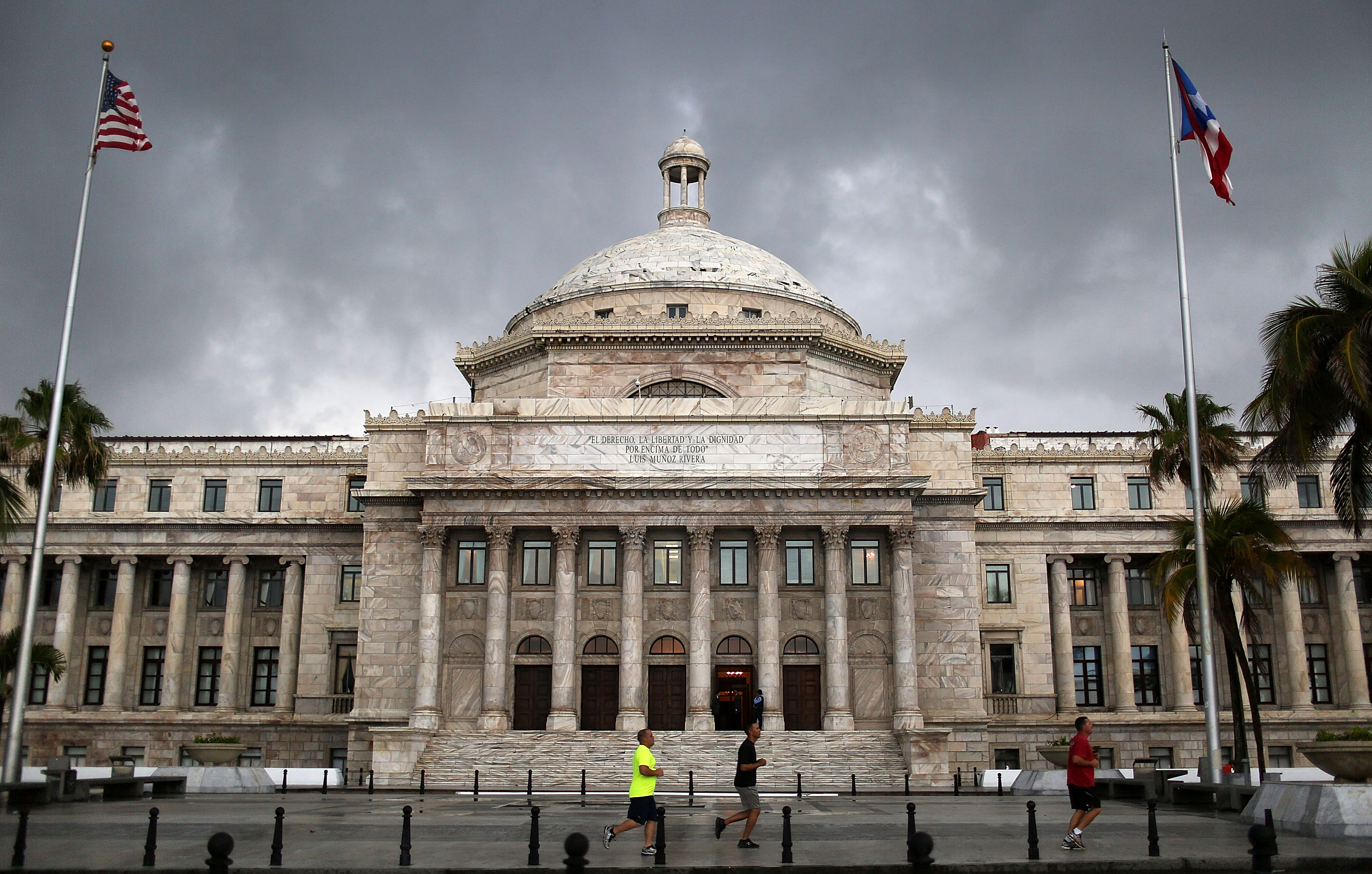America is turning Puerto Rico into Greece
The United States is now bleeding the island dry to satisfy wealthy bondholders


Greece is an economic disaster zone. Austerity imposed at economic knifepoint by eurozone authorities — the European Central Bank, the European Commission, and the IMF — cut spending and raised taxes, which naturally deepened the country's recession and increased its debt burden by throwing more people out of work and undermining its economic strength.
And now America is doing the exact same thing to Puerto Rico, its Caribbean colony.
For a variety of complicated reasons, the island has landed in a debt crisis similar to Greece's. But instead of learning from the staggering disaster created in the eurozone, Congress and President Obama in 2016 decided to turn the nation over to a bunch of Wall Street goons. They passed a law creating a "fiscal control board," more rightly called "la junta" by Puerto Ricans, as it is essentially a dictatorship of unelected technocrats.
The Week
Escape your echo chamber. Get the facts behind the news, plus analysis from multiple perspectives.

Sign up for The Week's Free Newsletters
From our morning news briefing to a weekly Good News Newsletter, get the best of The Week delivered directly to your inbox.
From our morning news briefing to a weekly Good News Newsletter, get the best of The Week delivered directly to your inbox.
The junta is now bleeding Puerto Rico dry to satisfy wealthy bondholders.
The roots of the economic problems in Puerto Rico are long and complicated. In brief, the island used to be a manufacturing hub due to a corporate tax exemption, but that was phased out by Congress in 1996 without any compensation. That and its odd treatment in shipping laws led to economic problems. The fact that Puerto Rican debt is exempt from federal, state, and local taxes (again due to a quirk of tax law) led Wall Street to offer extremely generous loans (to serve as a vehicle to stash cash tax-free), which papered over the economic problems for a time. The result was a buildup of $70 billion in debt and an eventual economic crisis. Then the island started hemorrhaging residents, as Puerto Ricans fled to the mainland looking for work.
However, the solution to such a problem is relatively straightforward. Puerto Rico cannot possibly repay its debts on anything like a short-term schedule, and probably not ever. It needs, first and foremost, a reduction on the amount owed, and an extension of the payment schedule — which is only fair as the debts were largely the product of moronic federal policy and Wall Street greed.
Of course, Puerto Rico would ideally be put on a more solid economic footing, too, with genuine economic reform to restore growth and employment. But that means things like infrastructure investment, sorting out its goofy treatment under tax and shipping law, and granting it full Social Security and Medicaid benefits (which it currently does not have). What will only hurt it is counterproductive austerity and attacks on labor that neoliberals misleadingly label "structural reform." In the short term, it needs more spending, not less.
A free daily email with the biggest news stories of the day – and the best features from TheWeek.com
Politically speaking, this crisis is the direct result of Puerto Rico's colonial status. It has no representation in Congress, no electoral votes, and does not enjoy the legal protections of statehood. As a result, Congress has yanked it around based on the whims of the mainland, often forgetting all about it for decades. By rights, it ought to be made a full state immediately, in addition to the reform package outlined above, as compensation for decades of colonial domination.
Instead, President Obama and the Republican Congress went the opposite direction, imposing a quite literal dictatorship under the Puerto Rican Oversight, Management, and Stability Act (or PROMESA, Spanish for "promise," how cute). Its seven-member board is not accountable to the Puerto Rican government, and has final say over "budget, laws, financial plans, and regulations." The act also granted special permission to lower the island's minimum wage for workers under 24 and a blanket exemption on new overtime rules.
The new PROMESA structure did delay the day of reckoning somewhat. But Obama mostly appointed financiers and bankruptcy lawyers to the board. Incomprehensibly, one of the non-financiers he appointed was a conservative policy analyst who has spent his career agitating for sweeping cuts to Social Security. Hilariously, the new executive director selected for the board in January turns out to own at least $265,000 in Puerto Rican bonds and debt — possibly a violation of conflict-of-interest provisions in PROMESA itself.
So it's no surprise the board is demanding eyewatering austerity — $1.5 billion in new taxes and $3 billion in cuts yearly, to be implemented over the next two years. These are gigantic cuts in an economy whose total size is about $70 billion, and would by the board's own estimates cause the economy to shrink by 16.2 percent next year. (Puerto Rico's new governor, a non-voting board member, naturally wants somewhat less austerity.)
All this is a fairly close recapitulation of the psychotically brutal economic pummeling the eurozone authorities dished out to Greece. What that nation and Puerto Rico needed was a friend to pick them up, dust them off, and get them back on a sustainable path to solvency and prosperity, where both bondholders and Puerto Ricans got a fair deal. But without democracy, with all the power in the hands of unelected neoliberal technocrats and financiers, and with all policy based on an ironclad commitment to austerity and debt repayment in full regardless of circumstance, the result will be full-blown depression without end.
Ryan Cooper is a national correspondent at TheWeek.com. His work has appeared in the Washington Monthly, The New Republic, and the Washington Post.
-
 What the new Making Tax Digital rules mean
What the new Making Tax Digital rules meanThe Explainer A new system will be introduced from April to overhaul how untaxed income is reported to HMRC
-
 The former largest iceberg is turning blue. It’s a bad sign.
The former largest iceberg is turning blue. It’s a bad sign.Under the radar It is quickly melting away
-
 Why Saudi Arabia is muscling in on the world of anime
Why Saudi Arabia is muscling in on the world of animeUnder the Radar The anime industry is the latest focus of the kingdom’s ‘soft power’ portfolio
-
 Iran cuts internet as protests escalate
Iran cuts internet as protests escalateSpeed Reada Government buildings across the country have been set on fire
-
 US nabs ‘shadow’ tanker claimed by Russia
US nabs ‘shadow’ tanker claimed by RussiaSpeed Read The ship was one of two vessels seized by the US military
-
 How Bulgaria’s government fell amid mass protests
How Bulgaria’s government fell amid mass protestsThe Explainer The country’s prime minister resigned as part of the fallout
-
 Femicide: Italy’s newest crime
Femicide: Italy’s newest crimeThe Explainer Landmark law to criminalise murder of a woman as an ‘act of hatred’ or ‘subjugation’ but critics say Italy is still deeply patriarchal
-
 Brazil’s Bolsonaro behind bars after appeals run out
Brazil’s Bolsonaro behind bars after appeals run outSpeed Read He will serve 27 years in prison
-
 Americans traveling abroad face renewed criticism in the Trump era
Americans traveling abroad face renewed criticism in the Trump eraThe Explainer Some of Trump’s behavior has Americans being questioned
-
 Nigeria confused by Trump invasion threat
Nigeria confused by Trump invasion threatSpeed Read Trump has claimed the country is persecuting Christians
-
 Sanae Takaichi: Japan’s Iron Lady set to be the country’s first woman prime minister
Sanae Takaichi: Japan’s Iron Lady set to be the country’s first woman prime ministerIn the Spotlight Takaichi is a member of Japan’s conservative, nationalist Liberal Democratic Party
